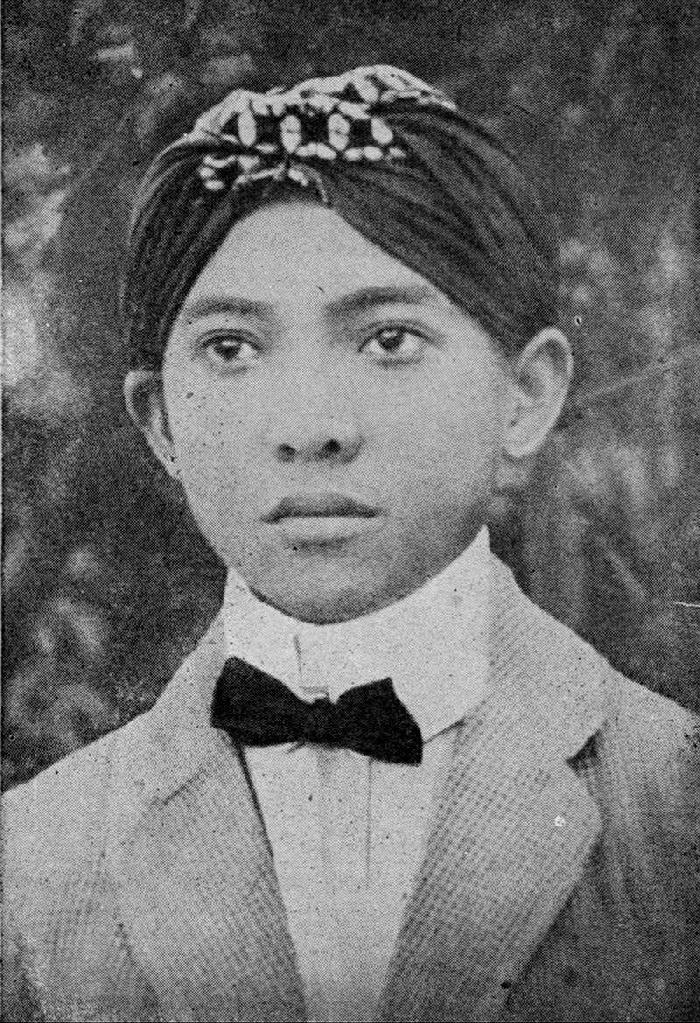
Indonesian Biography: Sukarno (1901-1970)

Figure 1.--Sukarno was a nationalist leader of Indonesia's struggle for Independence from the Netherlands. This is Sukarno at a Hogere Burgerschool (a Dutch higher level secondary school--HBS) student in Surabaya, East Java during 1916. He was an excellent student with a photograpohic memory. He mastered several indinesian and European languages.
|
|
President Sukarno, backed by the Army, declared the 1950 Provisional Constitution void and reintroduced the 1945 Constitution (1957). This provided a blue print as originally untended for Sukarno, popularly known as Bung Karno (Comrade Sukarno), to increase his power. He at first carefully ballabced power among three contending forces-- the PKI, the Army with Muslim sentiment, and himself. President Sukarno managed to dominated Indonesia in this way for two decades becoming a spokesman for the Third World. He presented himself on the international stage as a leader of a new world, free from Cold War antagonism. He was active in the Non-Aligned Movement. This often meant coming down on the Soviet Socialist side as opposed to democracy and free-market capitalism. He was not a dictator, although Indonesia was hardly a democracy. He did, however, mnage to dominate Indonesia. And he began to lose control (early-1960s). Sukarno like many third-world nationalists (Asad, Castro, Nasser, Nehru, Tito, and others) leaned left. Unlike some left-wing nationalist leaders, Sukarno was no aestetic. On a state visit to Japan he met a 19-yeat old art student at the Ginza hostess bar in Tokyo, near the Imperial Hotel -- Naoko Nemoto. They married in Indonesia (1962) She converted to Islam, and Sukarno gave her the Indonesian name Ratna Sari Dewi Soekarno. She became known as Dewi Sukarno. Many Third World leaders like Sukarmo were impressed with the Soviet Union and Communist China and what looked like their growing dominance over the democratic/capitalist West. Sukarno was finding increasingly difficult to balance the PKI and the Army and he began to see the future more with the PKI. His Socialist-oriented policies and coruption led inevitably to economic decline. It would be a few more years before the asian Tigers demonstrated that socialism did not work and capitalism did. Mounting conflicts were developing between the PKI and the non-Communist groups backed by the military. Sukarno saw himself losing control over the situation. And the PKI emboldened by the apparent success of Commumist China wanted control, convinced that they could solve the country's economic problems by collectivist Marxist policies.
CIH

Navigate the Children in History Website:
[About Us]
[Introduction]
[Biographies]
[Chronology]
[Climatology]
[Clothing]
[Disease and Health]
[Economics]
[Freedom]
[Geography]
[History]
[Human Nature]
[Ideology]
[Law]
[Nationalism]
[Presidents]
[Religion]
[Royalty]
[Science]
[Social Class]
[Bibliographies]
[Contributions]
[FAQs]
[Glossaries]
[Images]
[Links]
[Registration]
[Tools]
[Children in History Home]
Navigate the Boys' Historical Clothing national pages:
[Return to the Main Indonesian independen republic page ]
[Return to the Main Indonesian history page]
[Return to the Main Indonesian page]
[Return to the Main Oceania history page]
[Australia]
[Belgium]
[China]
[England]
[France]
[Germany]
[Ireland]
[Italy]
[Japan]
[Korea]
[Malaysia]
[Mexico]
[The Netherlands]
[Portugal]
[Scotland]
[Spain]
[United States]
Created: 6:33 AM 4/23/2017
Last updated: 11:17 PM 4/22/2017



